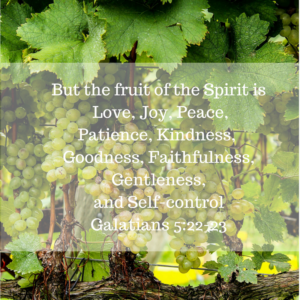Fruit of the Spirit vs. Fruit of Idolatry: Joy or Bitterness
 I used to have such a wrong idea about the Fruit of the Spirit. I’d read the verses in Galatians like a laundry list of so many things I couldn’t do enough, be enough. I would either flip to another book of the Bible, or vow to work on being more loving, joyful, peaceful, kind, etc. But the next day, I wouldn’t even be able to list all nine.
I used to have such a wrong idea about the Fruit of the Spirit. I’d read the verses in Galatians like a laundry list of so many things I couldn’t do enough, be enough. I would either flip to another book of the Bible, or vow to work on being more loving, joyful, peaceful, kind, etc. But the next day, I wouldn’t even be able to list all nine.
This post is the third in a series on walking with God instead of pursuing idolatry. You’ll find the previous one here.
Joy is easy to fake, isn’t it?
We know we should have it, so we put on our smiles and draw a sweet disposition out of our toes. Especially those of us who experienced childhood trauma learned to fake it, simply for our own survival. Those habits stick with us well into adulthood.
But if people could see inside, they’d know we were nursing deep hurts and disappointment. Even the very act of conjuring up joy in our own power feeds the root of bitterness.
We can hide bitterness with busy. We can hide it with avoidance behaviors. We can even hide it with charm.
It’s a human response, especially for those of us with a tendency towards performance-based religion. (Gotta make sure people see the joy of the Lord in us, right?)
The Apostle Paul had plenty of reasons to be bitter: falsely accused by his own Jewish brothers, beaten, arrested, imprisoned, and shipwrecked. I’m sure he dealt with the temptation to be bitter. Perhaps he was speaking from a hard-fought spiritual battle when he told the Philippians to rejoice in the Lord always.
But how do we stay joyful in a world that’s given us so many reasons to be bitter?
I think the writer of Hebrews offers a key insight.
I’ve never considered a connection between grace and joy (or between falling short of grace and bitterness) before, have you? But the two are clearly linked in this verse.
Perhaps a little something got lost in the translation from Greek to English.
The Greek word for joy that Paul uses in Galatians is chará. It means joy, delight, rejoicing, or gladness.
Grace, in the Greek is charis. Both words have the same root (char).
 In his letter to the Romans, Paul mentions that the hope of glory is the basis for our joy. In other words, our joy doesn’t come from current circumstances (or it would surely wax and wane), but from our eternal destination, a gift of grace, paid for with the death, burial, and resurrection of Jesus.
In his letter to the Romans, Paul mentions that the hope of glory is the basis for our joy. In other words, our joy doesn’t come from current circumstances (or it would surely wax and wane), but from our eternal destination, a gift of grace, paid for with the death, burial, and resurrection of Jesus.
I used to think that falling short of the grace of God meant backsliding, or worldliness and living in sin.
I’ve come to realize falling short of God’s grace has a broader definition. In addition to blatant sin, it’s also trying to live under our own power (even if we work hard at being good and obedient).
Conjuring up our own joy (and a lot of us have gotten good at it) isn’t true joy when we’re still weighed down by things that burden us. When we realize our encumbrances aren’t going away anytime soon, we quickly become disillusioned (bitter root growing up) and lose our joy.
As I talked about in previous posts on peace and love, the fruit of joy only comes as we walk with the Spirit. In communing with Him, we can delight in the fact that He is teaching, molding, and guiding through our suffering with the end result of a glory-filled eternity with Jesus.
Here on earth, where we’re bound by time and space, it’s not easy to keep this perspective. But a sure sign we’re walking closely with the Spirit is that we’re rejoicing in the gift He’s given us, despite our grief, and despite the pain we must sometimes endure. He points ahead to the promise, made long ago, that is yet to come:
“And the ransomed of the LORD will return and come with joyful shouting to Zion, With everlasting joy upon their heads. They will find gladness and joy, and sorrow and sighing will flee away” (Isaiah 35:10).
My prayer for you, dear reader, and for myself, is that God would teach us to walk with His Spirit closer and closer until we can truly rejoice in the Lord in every circumstance.
Thanks for coming on this journey to explore the Fruit of the Spirit with me.
If you’d like to read the previous posts in the series, click here for Love or Apathy and here for Peace or Anxiety.
I’d love to hear your thoughts. Please feel free to continue the conversation in the comments.



The Conversation
Excellent post, Lyneta! I pray that I host the presence of the Holy Spirit with authenticity so that His fruit is a natural orchard growing out of my spirit – His. I’m so grateful for orchards of joy!
That’s what I pray too, Lynn. I love that word picture–orchards of joy!